| Srl | Item |
| 1 |
ID:
060603
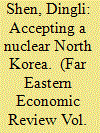

|
|
|
| 2 |
ID:
169152
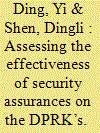

|
|
|
|
|
| Summary/Abstract |
In the Democratic People’s Republic of Korea (DPRK)’s case of nuclear
proliferation, less attention has been paid to the role of security assurances. This
paper seeks to assess the role of security assurances for the DPRK provided by the
UN, the Soviet Union, China, and the United States and to figure out why these
assurances are less effective to bridle its nuclear ambition. It argues that an effective
security assurance for nuclear non-proliferation should meet at least two conditions.
Firstly the security assurance should be credible, which can be realized by being
publicized, legally binding, and infusing with further commitments. Secondly, the
security assurance tailored to the unique features of the target state’s concerns is
more likely to be effective. Using this set of criteria, the only moderately effective
assurance is that provided by the Soviet Union. The general security assurance
of the UN is neither legally binding nor specifically targeted. The alliance with
China exists only on paper as Pyongyang believes Beijing is reluctant to fulfill its
obligation as an ally. The United States is taking a capricious attitude on the DPRK
and none of its security assurances are legalized or address its major concern of
regime survival. These may help explain why security assurances failed to prevent
the DPRK from acquiring nuclear weapons.
|
|
|
|
|
|
|
|
|
|
|
|
|
|
|
|
| 3 |
ID:
082175
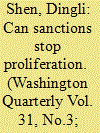

|
|
|
|
|
| Publication |
2008.
|
| Summary/Abstract |
How effective have sanctions been, and what do the North Korea and Iran cases say about China's evolving attitudes toward sanctions as a nonproliferation tool
|
|
|
|
|
|
|
|
|
|
|
|
|
|
|
|
| 4 |
ID:
020488
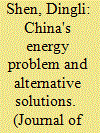

|
|
|
|
|
| Publication |
Nov 2001.
|
| Description |
717-722
|
| Summary/Abstract |
China is facing a myriad of internal challenges and problems, the energy issue being one of the most outstanding of them. With the rapid development of the Chinese economy, there emerged acute energy and environmental problems which need to be alleviated. This paper examines this challenge, and puts forward alternative solutions. It also evaluates its impact on regional security
|
|
|
|
|
|
|
|
|
|
|
|
|
|
|
|
| 5 |
ID:
082540
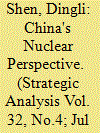

|
|
|
|
|
| Publication |
2008.
|
| Summary/Abstract |
This article offers a Chinese perspective on reducing the threat of nuclear weapons due to nuclear weapons proliferation and its deterrent gestures, long employed since the Cold War. It is pointed out that nuclear weapons are increasingly irrelevant to nuclear weapons states. However, some non-nuclear weapons states may view this differently. Nuclear abolition has presented a visionary opportunity for all sides to relinquish those weapons increasingly unnecessary for nuclear weapons states. Before such an idealistic world is attained, efforts of nuclear non-proliferation are indispensable along with a process of nuclear disarmament.
*This article is written for this issue of Strategic Analysis only, as part of the Project of 'A Sino-US Joint Study of Non-Traditional Security' at the Center for American Studies, Fudan University (State Innovative Research Base of Philosophy and Social Science
|
|
|
|
|
|
|
|
|
|
|
|
|
|
|
|
| 6 |
ID:
090959


|
|
|
|
|
| Publication |
2009.
|
| Summary/Abstract |
Why has the Democratic People's Republic of Korea (DPRK) been so defiant against the international community? What could be its external and internal motivations to carry out new missile tests, and even a new nuclear test, in spring 2009 when its economy is in shambles and a large portion of its population is starving? Why has President Barack Obama's "smart power" diplomacy, which stresses dialogue with countries with which the United States has long had difficulties, not worked well with Pyongyang so far? Why does North Korea seem to be ignoring its key ally, China, and its concerns? Beijing is now in an awkward position as North Korea looks uninterested in bestowing any credibility on China's efforts to sustain the Six-Party Talks that are aimed at denuclearizing the Korean peninsula.
|
|
|
|
|
|
|
|
|
|
|
|
|
|
|
|
| 7 |
ID:
068908


|
|
|
| 8 |
ID:
067802


|
|
|
| 9 |
ID:
130274


|
|
|
|
|
| Publication |
2013.
|
| Summary/Abstract |
Since President Obama delivered his Prague speech four years ago, the prospects for nuclear disarmament and nonproliferation have actually not become more straightforward. This is partly due to the current state of international relations. Financial and fiscal frustration has beleaguered both the United States and the European Union (EU), and global economic growth has widely slowed. With China becoming more confident and the second-biggest economic entity in 2010, the distrust between Washington and Beijing continues to rise. Tensions over the past years concerning the change of regimes in West Asia and North Africa, the so called "Arabic Spring," as well as the U.S. "rebalancing" in East Asia further strain international relations. U.S.-Russia relations also suffer. Although the two countries brokered the new START Treaty of 2010, momentum has slowed on establishing deeper nuclear cuts. Given their different positions over the recent turbulence in Libya and the ongoing conflict in Syria, it is improbable that the United States and Russia could strategically "reset" relations to move down the road of nuclear disarmament.
|
|
|
|
|
|
|
|
|
|
|
|
|
|
|
|